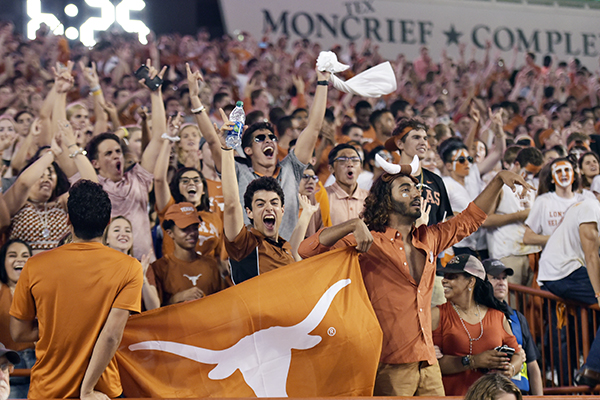UT President Gregory Fenves is reviewing a proposal that some say would hurt student representation on the Intercollegiate Athletics Council, one of the most powerful advisory committees on campus.
Students currently have one vote on each nine-member athletics council, one for men’s and one for women’s sports. Under the new proposal, the councils would combine into one 12-member entity with one student vote, mirroring the consolidation of the men’s and women’s athletics departments and giving faculty a greater voting stake. Other Big 12 and SEC schools by comparison all have 2 to 3 voting student members on their athletics councils.
But current and former student members of the council said the bigger issue is changing the member-elect/member system. The proposal eliminates the student member-elect, a non-voting member who attends meetings for the first year in preparation for their term as the voting member. This reduces the influence student members have on the council and the athletics department.
The council, created in 1905, typically discusses issues related to ticket prices, hiring coaches or other personnel, how many days student athletes can miss class for events and how to get students to attend more games.
Most recently, the now-contiguous student section for football games at Darrel K Royal-Texas Memorial Stadium was proposed by student member Matt Offil.
“It’s essentially cutting the number of student voices in the room in half,” said Offill, a mechanical engineering senior. “That’s concerning because students do a ton for the University. And everybody on the athletics council will agree that student input is incredibly important to them.”
Offill and the other current member, Andrew Bramlett, a business graduate student, said their years as a member-elect were helpful for learning the ropes and making the most of their second years.
In a letter obtained by The Daily Texan, student body president Colton Becker — who nominates the student members each year — said he agreed with combining the councils, but asked Fenves to keep the member-elect position. He also cited the use of the member-elect and member system for the University Co-op Board of Directors and the Student Services Budget Committee as examples of where the system works elsewhere at UT.
Associate athletics director Chris Plonsky said part of the goal of the changes is to give faculty greater influence on the council by increasing their voting stake from 55% to 67%. But Becker wrote that keeping the student member-elect does not reduce faculty control because that person does not vote.
“I sympathize with desire to have a more faculty controlled and simplified advisory body, especially given all the noise and scrutiny that surrounds our elite athletics program,” Becker said in the letter that both Offil and Bramlett endorsed. “But even if students aren’t experts, we certainly create value for the council (and our athletics programs) and deserve more than a ceremonial voice at the table.”
Plonsky said the changes aren’t meant to dilute student representation, but instead will make every person on the council a voting member.
“We’ve never had any conversations about what I would call ‘elimination,’” Plonsky said. “This is all being done in the spirit of trying to create one uniform united council for athletics that is advisory to the president of which a student always will be a member.”
Plonsky also noted the student position was the only position to have a member-elect/member system within the council, so it didn’t make sense to have one member with a training period when no others had that.
Additionally, Offill and Bramlett expressed frustration with the changes because they felt like they came “out of the blue.” Both said they didn’t know who proposed or supported eliminating the student member-elect position.
Plonsky said the proposal was written by the University Policy Office after receiving input from the athletics department, the men’s and women’s councils and others involved in athletics, but that there was not a single person these ideas came from.
Despite any issues with the process, Bramlett and Offill said they still felt supported by faculty members of the council and the athletics department, and simply want to maintain the status quo.
“Having a voting and a non-voting (student) member doesn’t change the influence of faculty on the council,” Bramlett said. “It allows the student voice to be heard with more importance in a stronger way.”
UT communications strategist Shilpa Bakre said the proposal is now under review by Fenves and that there is not yet a timeline on when it will be approved or sent back.





















